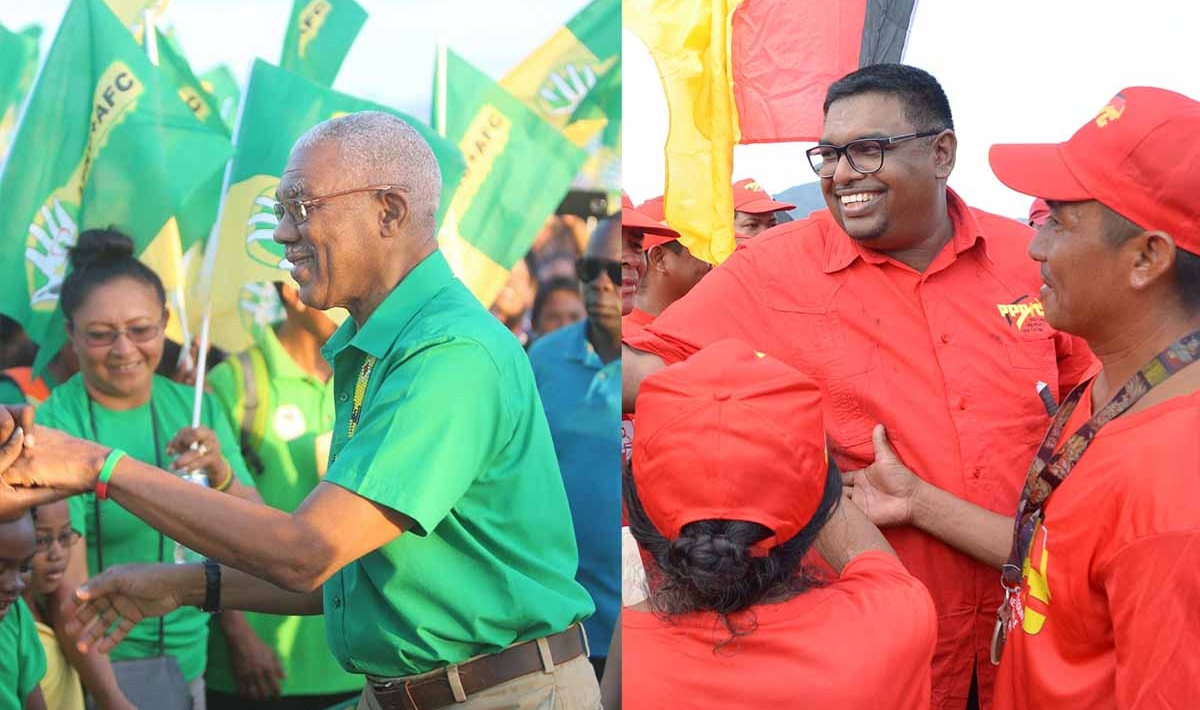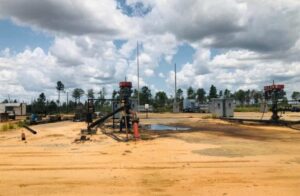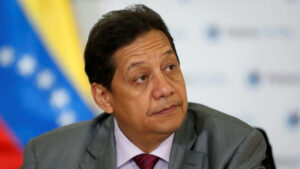
(World Politics Review, 28.Apr.2020) — Despite growing signs of a dramatic and global economic downturn stemming from the coronavirus pandemic, the small South American country of Guyana appears poised for a period of spectacular economic growth. In its recent semiannual report on Latin America and the Caribbean, the World Bank forecasts a 4.6 percent contraction for the region’s economy in 2020, followed by an expansion of 2.6 percent in 2021. However, the World Bank sees Guyana’s economy skyrocketing by 51.7 percent in 2020, before leveling off to 8.7 percent in 2021.
The reason for this very rosy outlook? In December, ExxonMobil began pumping oil from the first in a series of deepwater wells being developed off Guyana’s coast. Before the recent drop in oil prices, the International Monetary Fund projected that oil revenues would lift per-capita income in the former British colony nearly four-fold by 2024—from just over $5,200 to $19,400. By 2030, the government’s share of earnings from oil could reach $10 billion in real terms, the IMF predicts. That is more than twice the country’s current GDP.
While these estimates may fall a bit short depending on how long the current slump in crude prices lasts, oil will nonetheless continue to be the dominant factor in Guyana’s economy. With a population of approximately 780,000, the country could soon produce a barrel of oil per person per day. Even if the price per barrel languishes in the $30 per barrel range, $9.5 billion will be generated per year—a staggering sum for a country like Guyana.
Guyanese officials are promising a drastic increase in the quality of life for citizens as a result of this economic expansion, but the discovery of oil has often turned out to be a curse rather than a blessing for many developing countries. The surge in oil-generated government revenues often creates a toxic mix of corruption and patronage that undermines democratic governance and overshadows non-oil-related parts of the economy. Oil production is fundamentally a capital-intensive process, so while it generates tremendous wealth, it does not create very many jobs. Also, the wealth generated by oil tends to corrode political institutions that, in many cases, are already weak.
Guyana looks to be no exception, as the country has been mired in a political crisis since a disputed presidential election last month that was supposed to decide who would control the initial influx of petrodollars into the country. As the votes were tabulated on election night, President David Granger and his ruling coalition, A Partnership for National Unity-Alliance for Change, looked to be in danger of losing their hold on power. With results in from all but one district, the opposition People’s Progressive Party, or PPP, appeared to have an insurmountable lead of 51,000 votes.
But in a highly unusual move, election authorities delayed posting the results for the country’s most populous voting district, an area known as Region Four. When they were finally released on March 13, results from the district put the ruling coalition in the lead by 59,000 votes. The PPP immediately rejected the results and demanded a recount with independent observers in place, accusing the Granger administration of vote-rigging and “thievery.”
In the aftermath of the contested vote, an international observer mission in Guyana concluded that “the tabulation of results for the election in Region 4 was interrupted and remains incomplete.” The Justice Institute of Guyana, the country’s independent bar association, notably linked the government’s failure to tabulate the results of the election for Region Four to the oil curse. “Today, disrespect for the rule of law is the lived reality in Guyana,” it said in a statement.
After a lengthy legal battle, the Guyana Elections Commission recently announced a recount of election ballots, which is expected to take at least 25 days. However, the opposition has expressed “grave doubt” concerning the lack of transparency in the process thus far, and questioned the commission’s credibility in conducting the recount.
Guyana’s unique republican form of government, a hybrid between a parliamentary and presidential system, is vulnerable to a standoff like this. All 65 seats of the unicameral legislature are allocated proportionally between competing parties according to their share of the national vote, while the leader of the party that wins a majority becomes president. This majoritarian system precludes the possibility of post-election pacts or coalition-building to ensure that the minority’s views are represented. Granger has been in office since May 2015, the same month that ExxonMobil first announced it had struck oil off the country’s coast. Even at that time, there were concerns that the winner of the next election would use its control over the burgeoning oil sector to try to cement its future political status by setting up a patronage system.
Further complicating the situation, the country is sharply divided along ethnic and political lines. Granger’s political grouping, A Partnership for National Unity, represents mainly Afro-Guyanese, who comprise around 30 percent of the population. The opposition PPP mostly represents those of Indian descent—roughly 40 percent of the population. The split is reinforced by the country’s proportional electoral system, which makes lawmakers directly accountable to party leaders rather than to constituents. In this environment, it is extremely difficult to forge policies that are in the national interest.
In response to the allegations of vote-rigging, U.S. Secretary of State Mike Pompeo has threatened “a variety of serious consequences” as determined by Washington for individuals who commit “electoral fraud and form illegitimate governments.” Other Western governments, as well as members of the Organization of American States, have issued statements to the effect that any government formed as a result of last month’s flawed election would be illegitimate.
Nearly two months after the election, the standoff remains unresolved. Swirling allegations of fraud mean that neither side is likely to accept the eventual election result fully. The danger is clear: A government lacking legitimacy or broad-based support will be more likely to squander the surge in oil revenues by using them to prop itself up. Should the crisis deepen, there is also the risk that investors will pull out of the oil project altogether. Already, a group of 80 global watchdog organizations have issued a joint statement urging ExxonMobil to cease business with Guyana if an unlawful government is sworn in.
In an ideal world, the ruling coalition and the PPP could find a way to form their own coalition government based on power-sharing rather than vote-rigging. That would ensure that the surge in new oil revenues can be fairly managed for the benefit of all Guyanese. Pressure from the international community and the country’s citizens may yet be able to move the country’s politics in a productive direction. Otherwise, expectations of an economic boom from oil might need to be dramatically tempered.
Robert Looney is a distinguished professor at the Naval Postgraduate School in Monterey, California. He specializes in issues relating to energy security and economic development in the Middle East, Africa, South Asia and Latin America.
***

